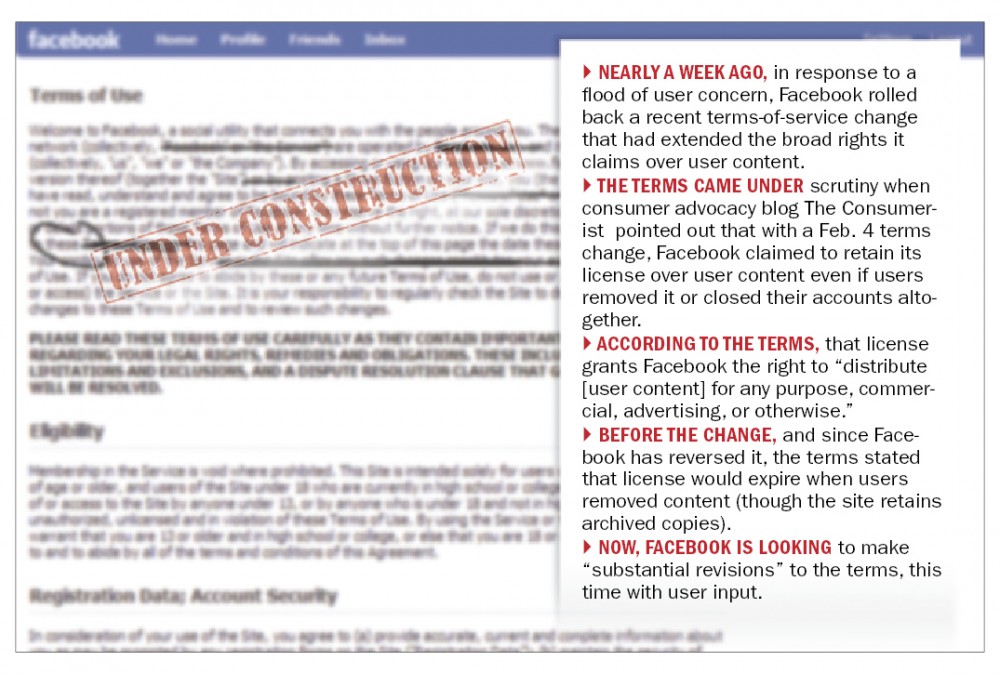For Facebook users worried the social networking site has given itself too many legal liberties when it comes to their content, now is the time to tell them. After rolling back a controversial terms-of-service change last Wednesday, Facebook is looking for user input to draft a new set of terms. The initial change prompted a backlash that University of Minnesota law professor William McGeveran said he thinks was a reaction less to the change itself than to the general breadth of FacebookâÄôs terms. The site likely made the change, he said, to ensure they could introduce features that use content in new ways, even if some of it was from former members. And, though its claims may alarm people, McGeveran said the terms arenâÄôt unusual.
âÄòEternal RightsâÄô
Whether inspired by the change itself or simply a fresh âÄî or first âÄî look at the terms, within a week, upwards of 135,000 members joined the group âÄúPeople Against the new Terms of Service.âÄù Los Angeles video-game producer Julius Harper started the group last Monday to get the word out about FacebookâÄôs extension of its user-content claims, which he calls âÄúridiculous.âÄù Though he said he didnâÄôt think the change was motivated by ill-intent, he still found it unacceptable that Facebook would have âÄúeternal rights to anything I ever posted.âÄù âÄúYou canâÄôt rely on the good intentions of somebody at a company,âÄù Harper said. The sentiment resonated and the groupâÄôs population exploded. After creating it, Harper went grocery shopping and came back to find 800 people had joined, he said. Economics and history junior Eric DeVoe said he was âÄúkind of startledâÄù to hear his content might stick around the site even if he removed it. Moreover, he said Facebook should alert users of terms changes and give them the option to either accept or opt-out. Harper said thatâÄôs a common sentiment âÄî users donâÄôt want to be bound by terms theyâÄôre not aware of. He thinks the outrage was due to the way the blogosphere and media reduced the change to a sound bite: âÄúFacebook owns your stuff forever.âÄù Though not entirely accurate, Harper said, it got the point across. By Wednesday, that outrage had fueled a blog post from Facebook CEO Mark Zuckerberg announcing the website would return to its previous terms until they could come up with something better, which he wrote they intend to do with the help of users. To that end, he started the group âÄúFacebook Bill of Rights and Responsibilities ,âÄù a forum for user input. Facebook enlisted Harper and his groupâÄôs co-administrator to help moderate the forum and pick out the big issues. Some of those issues, also expressed in HarperâÄôs group, include FacebookâÄôs right to use content like photos, music, writing, and other personal and creative work in advertisements without user permission.
Legal limits
McGeveran said many concerns, like the idea that Facebook would somehow share their photos with the world, are not that realistic. âÄúYour personal photos,âÄù he said, âÄúare only interesting to you and your friends anyway.âÄù Still, Harper said even though he agrees Facebook probably doesnâÄôt intend to hijack bandsâÄô work for commercials or put his nieceâÄôs photo on the side of a bus, their legal claim to do so is a problem. Indeed, DeVoe said, as the site âÄî and its potential income-generating and advertising power âÄî has grown, FacebookâÄôs âÄútrust usâÄù approach doesnâÄôt work for him anymore. He wants the new terms to spell out the limits of FacebookâÄôs rights to user content. He added he doesnâÄôt like the idea of Facebook using his name and photo in advertisements, even those directed at friends. And it is a real concern, McGeveran said, that Facebook will mine user-information to aid in social marketing âÄî tracking a memberâÄôs activity and using it to advertise to friends âÄî that people might find intrusive. He said heâÄôd like to see the site commit to getting opt-in consent before using peopleâÄôs identities for commercial purposes, like social marketing. In a more general way, Harper said people want to know and control exactly how Facebook will use their information, with something like Creative Commons licensing , so they can decide whether or not to let Facebook use their photos in targeted ads or otherwise. Whether this desire will be reflected in FacebookâÄôs revamped terms is tough to predict and depends on their business strategy, McGeveran said. As Facebook tries to figure out how to turn a profit, they donâÄôt want to foreclose their options, including social marketing. TheyâÄôll have to balance their goals of being seen as privacy-sensitive and making a profit as they reconsider the terms, he said. âÄúI really donâÄôt know where it will go,âÄù McGeveran said. âÄúI will be interested to see. ItâÄôs an experiment.âÄù Facebook declined to comment for this story, deferring to the siteâÄôs media blog.








